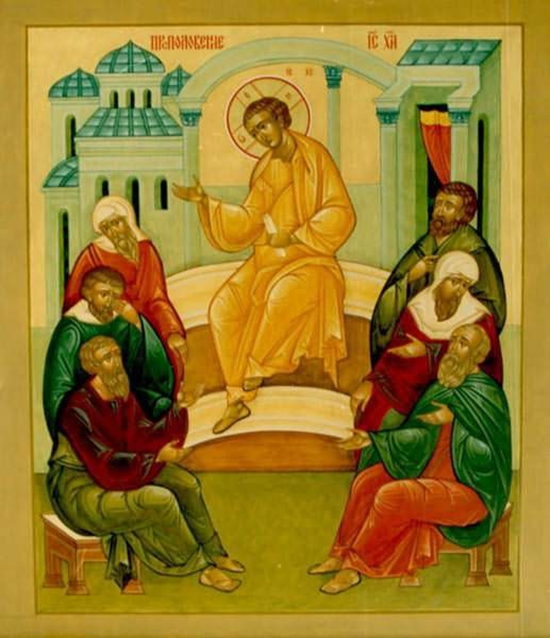Homecoming
Tenth Sunday Scripture Readings

The Greek philosopher, Heraclitus, one of the two foundational pre-Socratic Greek thinkers, is famous for his statement, παντα ῥει (panta rhei), meaning “everything flows,” and nothing remains the same. He went on to say that no one can step into a river twice because, each time, it’s a different river and a different foot. He was right. The universe is locked in an endless process of change, an ongoing temporal flow.
I left my hometown when I was about eighteen, only to return there about thirty-five years later … or did I? I lived in a different house on a different street and nothing about the town was the same except the hardware store in the center of town where the same goods were on the same shelves as when I was a boy. But, of course, they were different goods … and a different boy—a different river and a different foot. I learned then the meaning of, “you can never go home again.”
Today’s gospel begins by telling us that “Jesus came home with his disciples.” Like any of us coming home, everything may have been familiar, but nothing was the same. The biggest change, evidently, was in Jesus himself. He left Nazareth as a young seeker and returned as a noted rabbi and healer. He had been so changed by his mission of service to his heavenly Father and to his people that he was scarcely recognizable. Yet those who knew him couldn’t grasp the change. They saw him as possessed by a demon and out of his mind. His family even came to where he was staying to try and “rescue” him.
Here’s a hard truth about families and, what’s more, about any human system—be it family, work, church, or government—systems like those exist to maintain themselves as they are. That means that all systems resist change, even when the change would benefit them. Systems exist to maintain the status quo and will block or attempt to destroy anyone or anything that attempts to change it. From within the system, non-conformity is perceived as a threat to its very existence. Change is to be feared and resisted at all costs. To the people of Israel—including Jesus’s own family—and to the religious and governmental leadership, Jesus was seen as exactly that kind of threat. His family wanted to detain him, the authorities chose to kill him—anything to avoid having to change.
Yet, no one could deny the power and efficacy of his message and mission. They could only ridicule and disparage it. Jesus’s response was simply to point to the results. “Go and tell John what you have seen and heard: that the blind see, the lame walk, the lepers are cleansed, the deaf hear, the dead are raised, to the poor the gospel is preached.” [Luke 7:22] In other words, if his power were the power of evil, how then could it be producing such good? Systems cannot see change as anything but evil, so, for them, change for the good is unthinkable and must be stopped.
Look at our own current society. The prevalence and power of this system are glaringly obvious. There is a gut-level, radical fear of change. The exact principles that Jesus taught are dismissed as evil, ridiculed as “woke,” and provoke violent reactions from the defenders of the status quo. As the greatest possible irony of this or any age, Jesus’s present-day family and followers—those who claim for themselves the name “Christian”—are prepared to fight to the death against the very teachings of the one they claim as their Messiah. Without any awareness of what they’re doing, they attack those who dare to preach metanoia—the change of mind and heart that forms the basis of Christianity—saying, in effect, “By the prince of demons he drives out demons.” In so doing, they come perilously close to committing the sin against the Holy Spirit—the unforgivable sin.
How is that? There are at least two ways that people can sin against the Holy Spirit. The first way is to deny that God has the power or the will to forgive. No one can be forgiven who doesn’t believe that forgiveness is possible. God doesn’t force forgiveness onto anyone. The other way to sin against the Holy Spirit is to deny that God is the power behind positive change. Our mission as Christians is to proclaim the coming of the reign of God and to call all people to a change of mind and heart. The Holy Spirit of God is nothing if not disturbing and disrupting of the status quo. To fight against spiritual growth is to fight against God, and that growth is never-ending, never finished, never complete. Life is the school of love, and we will never love as God loves. Our faith challenges us to grow in love. To suggest otherwise is blasphemy. We are not and never will be “woke” enough.
Look around at the “families” we belong to, the systems where we feel most “at home.” They call to us to give up trying to change ourselves, to change the world, to change them. So, the gospel today puts us in Jesus’ place. Who are our “families?” To what systems do we belong? Consider all those who, with you, are struggling to love as Jesus loved: to love the stranger, the foreigner, the dispossessed, the weird, the outlaws, the “immoral,” the despised. Those who strive to love as Jesus loved are those who do the will of God. They are the ones who are brother and sister and mother to Jesus, and to us. These are the members of our true family in the Holy Spirit. For, like Jesus, we have not been called so much to join and conform ourselves to the Church as it is—but to confront it and challenge it to grow into the Church it must become.
Get articles from H. Les Brown delivered to your email inbox.